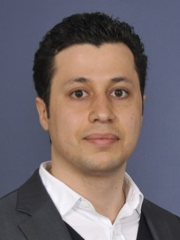Go to
Pantelis Georgiou
Position statement:
Bio-inspired Semiconductors for Healthcare
In the last decade we have seen a convergence of semiconductor technology into the world of healthcare providing novel solutions for early detection, diagnosis and therapy of disease. This has been made possible due to the emergence of CMOS technology, allowing fabrication of advanced systems with great functionality at low cost. Furthermore, CMOS technologies are on a ruthless scaling trend according to Moore’s law that has seen the number of transistors per CMOS chip double every two years. Until now this has been used to drive the computer industry to make faster and cheaper computers, yet as shall be described in this talk we show how such a technological trend can also be beneficial for the healthcare sector leveraging on advantages of CMOS based systems such as scalability, low-cost, system-integration and low power processing.
In this talk I present an overview of how semiconductor technology is now being used for early detection on therapy of disease. Specifically two areas are described, which are currently utilizing CMOS technology with tremendous benefit in healthcare. The first is in genomics, whereby advances in CMOS-based ISFET technology is now allowing implementation of point-of-care diagnostic systems as well as genetic sequencing systems which are scalable, miniature and fabricated at low cost, and the second is in bio-inspired artificial organs, whereby low-power CMOS-based systems can be designed to replicate biology to provide implantable and portable personalized medical devices such as the bio-inspired artificial pancreas which we have developed for treatment of diabetes.
About the panel member:
 Pantelis Georgiou currently holds the position of Lecturer at Imperial College London within the Department of Electrical and Electronic Engineering. He is the head of the Bio-inspired Metabolic Technology Laboratory in the Centre for Bio-Inspired Technology; a multi-disciplinary group that invents, develops and demonstrates advanced micro-devices to meet global challenges in biomedical science and healthcare. He is also part of the Medical Engineering Solutions in Osteoarthritis Centre of Excellence. His research includes ultra-low power micro-electronics, bio-inspired circuits and systems, lab-on-chip technology and application of micro-electronic technology to create novel medical devices. The current focus of his research is on creating technologies for treatment of diabetes.
Pantelis Georgiou currently holds the position of Lecturer at Imperial College London within the Department of Electrical and Electronic Engineering. He is the head of the Bio-inspired Metabolic Technology Laboratory in the Centre for Bio-Inspired Technology; a multi-disciplinary group that invents, develops and demonstrates advanced micro-devices to meet global challenges in biomedical science and healthcare. He is also part of the Medical Engineering Solutions in Osteoarthritis Centre of Excellence. His research includes ultra-low power micro-electronics, bio-inspired circuits and systems, lab-on-chip technology and application of micro-electronic technology to create novel medical devices. The current focus of his research is on creating technologies for treatment of diabetes.
Dr. Georgiou graduated with a 1st Class Honours MEng Degree in Electrical and Electronic Engineering in 2004 and Ph.D. degree in 2008 both from Imperial College London. He then joined the Institute of Biomedical Engineering as Research Associate until 2010, when he was appointed Head of the Bio-inspired Metabolic Technology Laboratory. In 2011, he joined the Department of Electrical & Electronic Engineering, where he currently holds an academic faculty position. He conducted pioneering work on the silicon beta cell and is now leading the project forward to the development of the first bio-inspired artificial pancreas for treatment of Type I diabetes. Dr Georgiou is a member of the IEEE and IET and serves on the BioCAS and Sensory Systems technical committees of the IEEE CAS Society. In 2013 he was awarded the IET Mike Sergeant Achievement Medal for his outstanding contributions to engineering and development of the artificial pancreas.
Secondary navigation
- EPFL Workshop on Logic Synthesis and Emerging Technologies
- Luca Amaru
- Luca Benini
- Giovanni De Micheli
- Srini Devadas
- Antun Domic
- Rolf Drechsler
- Pierre-Emmanuel Gaillardon
- Jie-Hong Roland Jiang
- Akash Kumar
- Shahar Kvatinsky
- Yusuf Leblebici
- Shin-ichi Minato
- Alan Mishchenko
- Vijaykrishnan Narayanan
- Ian O'Connor
- Andre Inacio Reis
- Martin Roetteler
- Julien Ryckaert
- Mathias Soeken
- Christof Teuscher
- Zhiru Zhang
- Symposium on Emerging Trends in Computing
- Layout synthesis: A golden DA topic
- EPFL Workshop on Logic Synthesis & Verification
- Luca Amaru
- Luca Benini
- Robert Brayton
- Maciej Ciesielski
- Valentina Ciriani
- Jovanka Ciric-Vujkovic
- Jason Cong
- Jordi Cortadella
- Giovanni De Micheli
- Antun Domic
- Rolf Drechsler
- Henri Fraisse
- Paolo Ienne
- Viktor Kuncak
- Enrico Macii
- Igor Markov
- Steven M. Nowick
- Tsutomu Sasao
- Alena Simalatsar
- Leon Stok
- Dirk Stroobandt
- Tiziano Villa
- Symposium on Emerging Trends in Electronics
- Raul Camposano
- Anantha Chandrakasan
- Jo De Boeck
- Gerhard Fettweis
- Steve Furber
- Philippe Magarshack
- Takayasu Sakurai
- Alberto Sangiovanni-Vincentelli
- Ken Shepard
- VENUE
- Panel on Circuits in Emerging Nanotechnologies
- Panel on Emerging Methods of Computing
- Panel on The Role of Universities in the Emerging ICT World
- Panel on Design Challenges Ahead
- Panel on Alternative Use of Silicon
- Nano-Bio Technologies for Lab-on-Chip
- Functionality-Enhanced Devices Workshop
- More Moore: Designing Ultra-Complex System-on-Chips
- Design Technologies for a New Era
- Nanotechnology for Health
- Secure Systems Design
- Surface Treatments and Biochip Sensors
- Security/Privacy of IMDs
- Nanosystem Design and Variability
- Past Events Archive
